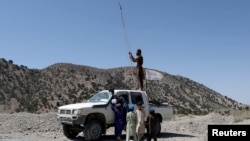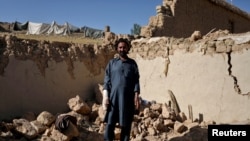The World Health Organization said Sunday it was stepping up surveillance of infectious diseases in earthquake-hit areas of Afghanistan following warnings by local authorities that thousands of survivors are at risk of disease.
Afghan officials reported at least 1,150 people were killed, many more were injured, and thousands of homes were damaged or destroyed in Wednesday’s powerful quake.
The latest U.N. findings Sunday revealed that at least 155 children were among those killed and nearly 250 children were injured by the quake, with 65 reportedly orphaned or left unaccompanied.
The calamity caused most of the destruction in the southeastern Afghan provinces of Paktika and Khost, some of the poorest and remotest mountainous areas near the Pakistani border, which lack the infrastructure to withstand disasters of this scale.
“The people are extremely needy for food and clean water,” Afghan health ministry spokesperson Sharafat Zaman said Sunday. He added that officials had managed medicines for now but handling those who had lost their homes would be a challenge.
“We ask the international community, humanitarian organizations to help us... for food and medicine. The survivor might catch diseases because they don’t have proper houses and shelters for living.”
The WHO said in a statement that its response, and that of all health partners on the ground, is to treat the injured, save lives and minimize the risk of disease in the aftermath of this tragedy.
“WHO is increasing surveillance of infectious diseases such as acute watery diarrhea, measles, and COVID-19 by deploying disease surveillance and control officers and distributing medicines and supplies to health facilities in anticipation of an increase in cases.”
The statement noted that Afghanistan is one of the two remaining polio-endemic countries in the world, along with Pakistan, and polio staff are also contributing to relief efforts and supporting surveillance for other infectious diseases.
“The earthquake was yet another tragic reminder of the various risks facing the Afghan people and how critical that Afghanistan should not become another forgotten emergency by the global community,” said Luo Dapeng, the WHO representative in the war-torn country.
Hundreds of families were reportedly living in the open across several worst-affected districts. Those living in non-damaged and partially damaged buildings have also reportedly resorted to staying out in the open out of fear that there may be further tremors, according to U.N. officials.
Maryam, a 12-year-old survivor, was buried under the rubble for three hours before she was rescued. But her father, stepmother, two young sisters and brother were killed when the roof of their mud-and-wood home caved in on top of them, she told a representative with Save the Children.
“I thought the world was ending when I saw my family dead. My nephew [who died] was the most beloved. I look at his photos every day.”
The deadly earthquake is a major test for Afghanistan’s Islamist Taliban rulers, who seized power last August, but have not been granted formal recognition by the global community due to concerns about human rights, including those of women.
The United Nations and several neighboring countries have rushed aid to the devasted Afghan districts. But helping thousands of victims remains a challenge for foreign countries because of the suspension of aid and the imposition of financial as well as banking-sector sanctions on Taliban-governed Afghanistan.
Taliban Foreign Minister Amir Khan Muttaqi on Saturday urged Washington to roll back the sanctions and unfreeze billions of dollars in Afghan foreign assets, mostly held in the United States, to help aid groups smoothly bring in much needed assistance to quake victims.
Hours after Muttaqi’s statement, White House press secretary Karine Jean-Pierre reiterated while speaking to reporters Saturday that the administration was working to resolve the issue through a series of processes.
“We are urgently working to address complicated questions about the use of these funds to ensure they benefit the people of Afghanistan and not the Taliban,” she said.
She added that the Biden administration was not going to wait to help the people of Afghanistan recover and rebuild from their devastating earthquake. “USAID and our partner humanitarian organizations are already providing immediate assistance on the ground where it’s needed the most.”
President Joe Biden issued an executive order in February that was aimed at freeing up half the $7 billion in frozen Afghan central bank assets on U.S. soil. The money would be used to benefit the Afghan people while the rest would be held for its possible use in terrorism-related lawsuits against the Taliban.
Some information for this report was provided by Reuters.






